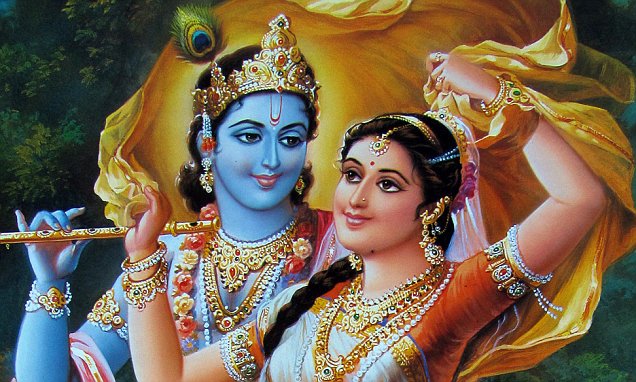The Narendra Modi government is set to spend Rs 245 crore developing a Ramayana circuit in a bid to boost ‘spiritual’ tourism in Ayodhya.
The development is expected to become a key political talking point ahead of next year’s Uttar Pradesh elections.
In addition to the project in ‘temple town’ Ayodhya, the tourism ministry has identified Nandigram, Shringverpur and Chitrakoot as other key areas for telling the story of the god-king Ram.

The Modi government is set to spend Rs 245 crore developing a Ramayana circuit in a bid to boost ‘spiritual’ tourism, potentially fanning the flames of the Ram Temple-Babri Masjid dispute
After the Ram Temple-Babri Masjid dispute, the development is likely to spark controversy.
The dispute has played out in the courts for decades but remains a powerful political issue.
Hard-line Hindu groups and some BJP leaders are pushing for a temple to be built at the site where activists razed the 16th century mosque in 1992.
“We have already identified these four cities with primary focus on the ancient city of Ayodhya,” the ministry of tourism’s assistant director general Bharati Kashyap Sharma told Mail Today.
“The MoT will develop massive tourism infrastructure facilities around these religious destinations. We have also finalised the tentative cost for the project.”
Asked if the tourism infrastructure would be set up around the disputed site in Ayodhya, she said, “We really need to zero in on the exact locations following UP government’s suggestion on the matter”.
According to sources at the ministry, the detailed project report (DPR) was prepared in the last week of June and was also approved in-principle in Uttar Pradesh.
The first meeting of a national panel on the Ramayana circuit under the Centre’s Swadesh Darshan scheme – that aims for integrated development of theme-based tourist circuits – was headed by tourism and culture minister Mahesh Sharma on June 14.
It was also attended by tourism secretary Vinod Zutshi as well as experts and other senior officials from the ministry where a detailed presentation was made on the subject.
The Ramayana is one of the largest ancient epics in world literature
Tracing the religious and historical route, the project will capture the ancient time when the city of Ayodhya was founded by Manu – the first man in the universe according to the Vedas – on the banks of the river Ghaghara about 9000 years ago.
The city which was also said to be the capital of the solar dynasty (Suryavansh), of which Ram was the most celebrated king.
Mail Toady has a copy of the DPR that says it would comprise a state-of-the-art audiovisual facility depicting the life of Ram on water-screen video projection.
Outdoor landscapes would also be used along with outdoor seating arrangements or open-air theatre.
The Babri Masjid mosque was destoryed in 1992 by militant Hindu nationalist groups. The incident triggered riots all over India leading to over 2,000 deaths.
The dynamic audiovisual show will use the latest technology with life-like images.
Under the Ramayana circuit, 11 destinations spread across six states had been proposed.
The destinations covered include Ayodhya, Nandigram, Shringverpur and Chitrakoot in Uttar Pradesh for the first two phases.
Sources said areas such as Sitamarhi, Buxar and Darbhanga in Bihar, Jagdalpur in Chhattisgarh, Bhadrachalam in Telangana, Hampi in Karnataka and Rameswaram in Tamil Nadu are also likely to be added later.
It was also learnt that the expert committee suggested the inclusion of Chitrakoot (Madhya Pradesh), Nashik and Nagpur (Maharashtra) and Mahendragiri (Odisha) in the proposed circuit during the high-level meeting.
The Ram gallery theme will focus on 10 different episodes of his life – Valmiki and Tulsi Ramayan, Bala Kanda, Ayodhya Kanda, Aranya Kanda, Kishkindha Kanda, Sundara Kanda, Lanka Kanda, Uttara Kanda, Lav-Kush Kanda and Ram Darbar.
A temple dedicated to the god Rama in Ayodhya
These thematic components will showcase life-size sculptures of Valmiki and Tulsidas, wall-to-wall scripts, large-screen interface depicting the differences of Valmiki and Tuslidas Ramayan and scriptures displayed on interactive screens so visitors can scroll through them and get comprehensive knowledge on the deity.
The projects details also revealed that the entire hallway of the Ayodhya Kanda will be decorated like a palace with sophisticated audiovisual effects and animation so that visitors can soak in the religious mood of the place.
Similarly, the entire Aranya Kanda will be jungle-based, depicting the lives of Sita, Ram and Laxman, while displaying Sita’s rasoi (kitchen) apart from an AV creation of the golden deer being hunted by Ram.
“The final attraction will be in the corridors where a mechanical ‘Pushpak Viman’ will take Sita and Ravan will fight with Jatayu.
This will be depicted via wall-to-wall screens in the final section of the corridor,” the project report says.

